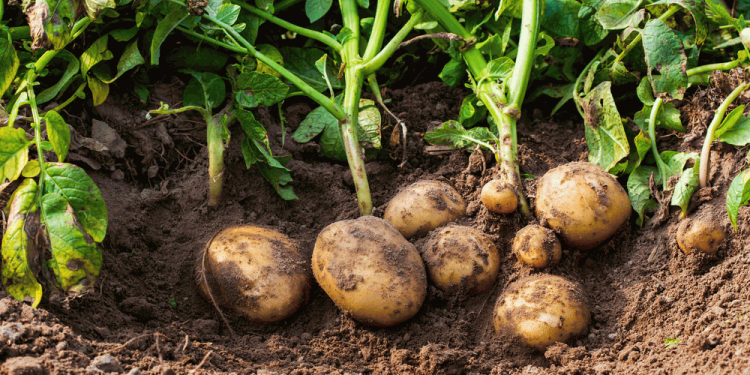ll parties who participated in the Crop Protection Implementation Programme are happy with the end result from their own perspective’, says Minister Carola Schouten of LNV. ‘When working out the plans, it is important that everyone stays positive, continues to listen to each other and understand each other’s views.’
The Minister spoke these motivating words on 28 September when handing over the report, which is part of the implementation programme, to fruit grower Leander Vereecken at his company in Dronten. The minister stressed that the development towards resilient cultivation systems and robust crops, as described in the report, is broad-based.
Trend break
Ten different parties from agriculture, horticulture and nature and environmental protection worked together with the government and supervisors on the implementation programme over the past 17 months. The aim is to achieve a trend break, in order to achieve an agriculture and horticulture that has less need for chemistry and is better balanced with nature and the environment.
Growers need to get wind in sail to take the right steps
The parties involved are Agrodis, Artemis, Ctgb, Cumela, Fedecom, LTO Netherlands, Nature and Environment, Nefyto, NVWA, Plantum, Union of Water Boards, Vewin and the Ministries of LNV and Infrastructure and Water Management.
Practical handles
Schouten states that it is good that the implementation programme has been written to give growers as many practical tools as possible for the transition to resilient cultivation systems. ‘This allows the grower to move on. It also shows that sectors are not going to sit around waiting for stricter rules, but are taking the initiative to be ahead of processes and to maintain public support. This plan also gives room in Brussels to get political affairs done.’
Joris Baecke, LTO portfolio holder Healthy Plants, calls putting the grower at the centre of the implementation programme crucial. But he also points to the shared responsibility of all parties involved. A grassroots consultation by LTO shows that members support the plan, but also set conditions.
According to Baecke, it is important that the focus is not only on the dot on the horizon. ‘Today too, we need to grow healthy crops and find solutions to current bottlenecks. Crop growers are also asking for an economic perspective. The reward for sustainability must come from the market. It is a common task to make society aware of this.’
Long-term financial commtiment
LTO expects a long-term financial commitment from the government to continue to support the transition to resilient cultivation systems. And also the commitment to create a level playing field within the EU. ‘The legal requirements must be the same for all food producers. This plan will only succeed if we eliminate unfair competition,’ says Baecke.
Nature and the Environment welcomes the fact that a large number of parties are working together on a better environment, but also believes that too much chemistry is still being used, according to programme manager Rob van Tilburg. ‘It’s a great choice to make sure growers get the wind in their sails to take the right steps.’
Carlos Nijenhuis of Nefyto explains that the crop protection industry can be expected to make efforts in the field of innovation and knowledge sharing. ‘Manufacturers will continue to develop new chemical and biological agents. For its progress, we ask the government to continue to base the authorisation of resources on scientific underpinnings and not leave this to politics.’
Focus on organic crop protection
Organic crop protection should become the mindset of crop growers, according to Piet Boonekamp of Artemis, the association for producers of green products. ‘Resilient plants in resilient cultivation systems form the basis. And if diseases and pests do occur, we fight them with organic plant protection products or low-risk agents without harmful environmental effects.’
Director Hans de Groene of Vewin, the organisation for drinking water companies, is also very enthusiastic about the implementation programme. He warns, however, that the challenges are great. ‘For example, the water quality is far from meeting the standards we have agreed to do so. The plan is wonderful, but it takes a lot of effort to achieve our goals.’
Admission of low-risk resources
At the end of her contribution, Schouten acknowledges that a number of issues still need to be settled from the government to support the implementation programme. She says she’s going to take action on that. ‘We are still striving for faster authorisation of low-risk resources and this also applies to new breeding techniques.’
But above all, consumers need to be convinced that healthy food has a price, the Minister argues. ‘It cannot be the case that all the costs of sustainability are borne by the producer.’
Government makes 12 million euros available for the time being
For the Implementation Programme for Crop Protection, the Ministry of LNV will make eur 12 million available for the period from 2020 to 2022. The budget of EUR 2, 4 and 6 million respectively for subsequent years is intended to finance, among other things, practical research, monitoring and pilot projects in various sectors and regions. The Agriculture Minister wrote in a letter to the House of Representatives this week that the budget is primarily intended to finance the first actions for the implementation programme. It considers a good start important to first of all underline the urgency of the transition to resilient cultivation systems. On the other hand, she wants to offer crop growers solutions to the short-term dilemmas. This is in line with LTO’s desire not only to look at the challenges of tomorrow.







